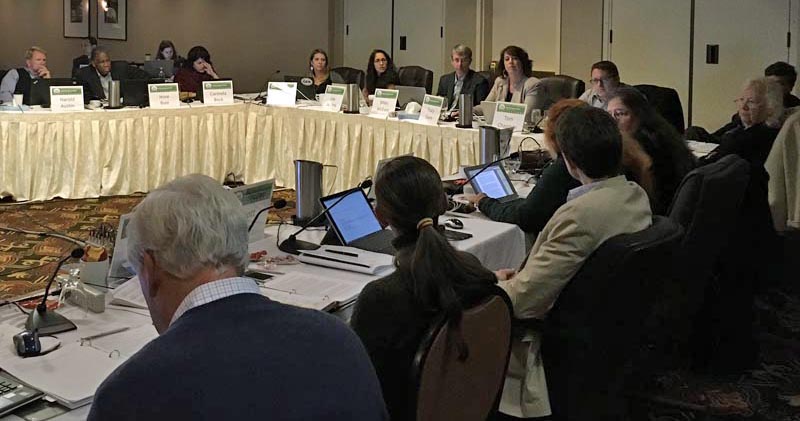New Briefing Paper Profiles Trump Appointees to the NOSB
Washington, DC — Continuing a trend well established by prior Republican and Democratic administrations, the five new members recently appointed by USDA Secretary Sonny Perdue to the National Organic Standards Board (NOSB) all have a current or past relationship with the industry’s major lobby group, the Organic Trade Association (OTA).
Over the past decade, Big Food has consolidated ownership of most of the largest and best-known organic brands. At the same time, many have criticized USDA for “stacking” the board, which is charged with guiding the regulatory oversight of organic farming and food production, with members from, or friendly to, corporate agribusiness interests.
OrganicEye, the investigative arm of Beyond Pesticides, has issued an industry briefing paper profiling the five newly appointed members of the NOSB with a focus on their relationship to corporate agribusiness and the industry’s powerful lobby group, the Organic Trade Association (OTA).
The NOSB was established when Congress passed the Organic Foods Production Act as part of the 1990 farm bill. The board was created to ensure that the voice of organic farmers and consumers drove the direction of USDA’s organic program when there was grave concern about handing over the budding organic farming movement to federal conventionally focused agriculture bureaucrats and the corrupting influence of corporate lobbyists.
“It is our job as the organic community to keep the board and USDA accountable to the standards of the law and to uphold the integrity of the organic label. We seek to ensure accountability to have the law work as it was intended by the drafters,” said Mark A. Kastel, Director of Washington-based OrganicEye, which acts as an industry watchdog and investigative group.

“We seek to ensure accountability to have the law work as it was intended by the drafters.” – Mark Kastel
Because of the challenge of limiting corporate influence, some never thought it was advisable to give the authority to USDA to oversee the organic label in the first place. “I was one of the cautionary voices warning my fellow pioneering organic farmers against trusting the federal government,” said Eliot Coleman, prominent Maine farmer and well-known author. “As predicted, USDA collusion allowed the profiteers and the deceptive marketers to take over the NOSB. The risk of fraud is now the order of the day. Us old-time organic growers, whose dedication to quality and integrity created the popularity of the organic label in the first place, must now demand an end to this charade.”
USDA has been accused of violating the spirit and letter of the law establishing the NOSB and has been the subject of lawsuits from those seeking to uphold the integrity of the National Organic Program at USDA. An early lawsuit challenged USDA’s allowance of synthetic ingredients in organic-labelled processed food. More recently, USDA was sued for appointing agribusiness executives to NOSB seats earmarked for farmers. An additional lawsuit challenged the legality of changing the requirement that a supermajority of the board was required to re-approve all synthetic and nonorganic ingredients and inputs used in organic production when they sunset every five years.
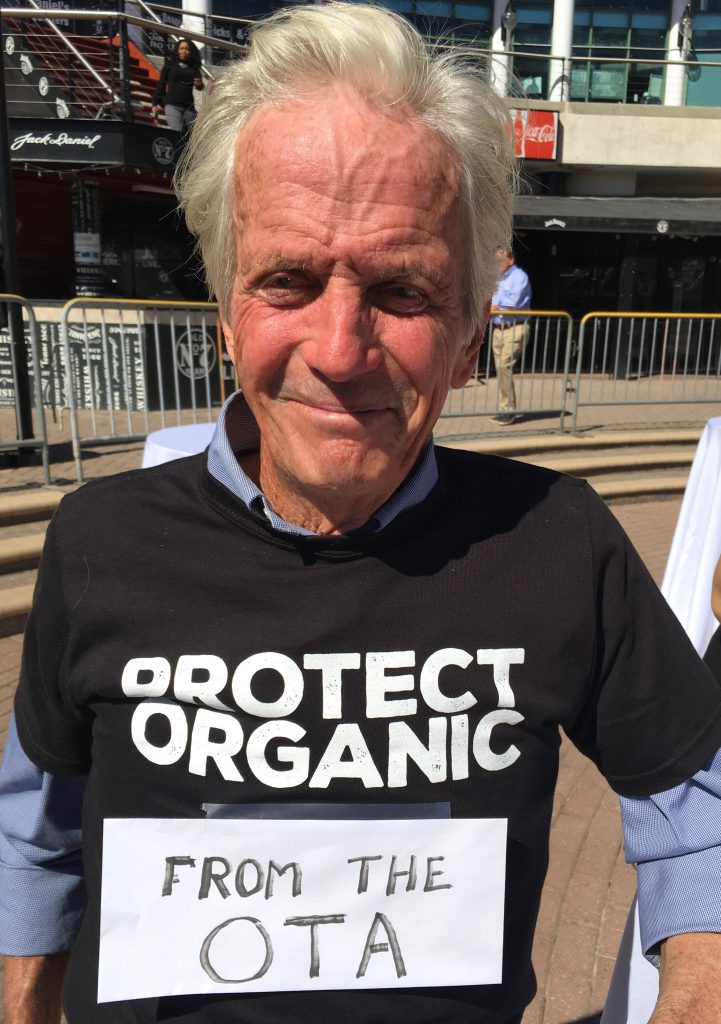
“USDA collusion allowed the profiteers and the deceptive marketers to take over the NOSB.” – Eliot Coleman
In response to the lawsuits accusing USDA of undermining the authority of the NOSB, corporate lobbyists and administration officials went to Congress, after the fact, to legalize their illegitimate conduct, said Mr. Kastel.
“Lobbying of Congress by USDA and powerful organic interests, in an effort to legitimize their illegal activities, confirms our allegations that collusion between USDA and corporate lobbyists undermined the authority Congress vested in the expert 15-member, diverse, industry stakeholder group,” added Mr. Kastel.
OrganicEye’s Mr. Kastel said that the organization would assume all new NOSB members will carry out their duties objectively, to serve the overall public, and will not criticize any of the individuals until their established voting record demonstrates a basis for concern. However, because of the history of USDA support for Big Food, ties to OTA, and the lack of background of some new members with organic principles, advocates are deeply concerned that the balance envisioned in the federal organic law —to bring together on the NOSB the rich diversity of the organic community and industry—will not be achieved.
New appointees include Nathan Powell-Palm, an organic farm operator from Montana (farmer seat); Kimberly Huseman, an employee of the nation’s second-largest conventional poultry processor, Pilgrim’s Pride (handler); Gerald D’Amore, a produce industry consultant with ties to some of the industry’s largest conventional grower-marketers (handler); Mindee Jeffery, a longtime employee in natural food groceries (retailer); and Wood Turner, VP of an investment capital firm and former executive with Dannon/Stonyfield, the nation’s largest organic yogurt producer (environmentalist/conservationist).
The industry has been in the same position before, watching USDA officials bypass eminently qualified candidates who have applied for seats on the NOSB, instead choosing agribusiness-connected candidates oftentimes with a very minimal history of involvement in the organic movement.
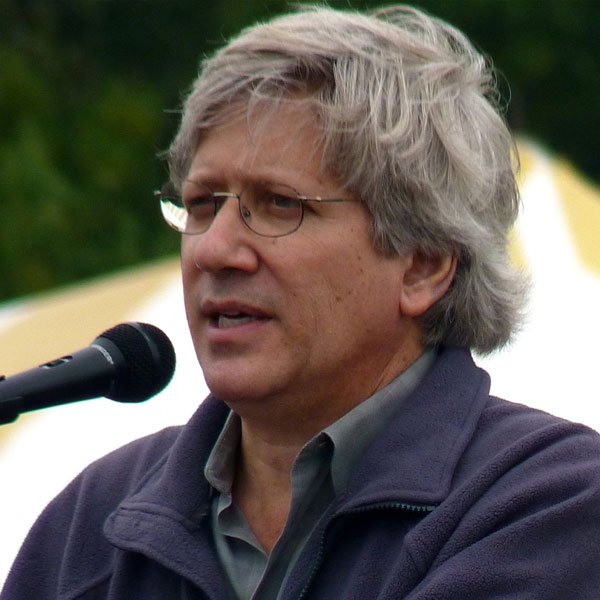
“The founders of the organic movement were on the right side of history. We won’t allow their vision to be exploited.” – Jay Feldman
Because of the dubious voting legacy of some corporate employees appointed to the NOSB, OrganicEye has created a link to a letter where, in less than two minutes, organic stakeholders can send a clear message to the CEOs who employ all current members of the board. The letter makes clear that we will, in the marketplace, educate the public if an organization’s staff member, serving on the NOSB, undermines organic principles and betrays our values.
In the past, staffers employed by prominent brands such as Horizon, Whole Foods, Earthbound Farms, Smucker’s, and Driscoll’s, as well as the OTA and CCOF, were accused of aligning with corporate lobbyists, instead of voting in the public interest, while sitting on the NOSB.
“As I have done in the past, OrganicEye just filed a request, under the Freedom of Information Act (FOIA), for the application packages of all nominees to the board,” Mr. Kastel stated. “We will update our report with anything we learn and also identify the qualified applicants who the political appointees at the USDA decided to pass over.”
OrganicEye and its leadership have been critical of the USDA National Organic Program’s ineffective enforcement oversight and have called out the OTA for heaping praise on the anemic program, while simultaneously lobbying to loosen the organic regulatory standards, resulting in hydroponic (soilless) produce production, livestock factories, and copious amounts of imported feed and ingredients of dubious pedigree flooding the market.
“After serving five years on the National Organic Standards Board myself,” said Jay Feldman, Executive Director of Beyond Pesticides, “I have witnessed how cards are stacked against independent voices. OrganicEye’s research is designed to empower industry stakeholders, so we can put pressure on our governmental officials and on brands that betray true organic values in the marketplace.”
–30-
MORE:
While OrganicEye is ramping up the fight against weakening the NOSB, including marketplace education, others are strictly focusing their efforts on marketplace activism in an effort to save organics.
A few years before his semi-retirement in 2018, and eventual resignation in 2019 from the industry watchdog he helped found, The Cornucopia Institute’s Will Fantle broke with his tradition of attending biannual NOSB meetings.
“The game is rigged,” Mr. Fantle lamented.
“The USDA’s trick is that they give us two or three exemplary appointees on the board at any one time and, on some votes, there are a few of their more independent colleagues who will follow their lead. But it’s generally never enough to be effective in terms of promulgating policy that protects and defends the organic farming movement.”
Pioneering organic farmers who lobbied Congress to pass OFPA won approval for a provision that pushes the board towards consensus by requiring that all “decisive” votes by the board be passed with a two-thirds supermajority. Mr. Fantle added, “The original supporters of the legislation would never have imagined the board becoming as corrupted as it has by corporate influence.”
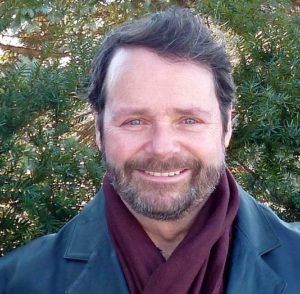
“The game is rigged.” – Will Fantle
“On controversial issues, that’s an insurmountable requirement with the board stacked with individuals from the corporate sector,” added Mr. Fantle.
Recent amendments to OFPA codify the diminishing role of working farmers on the board by allowing employees of vertically integrated factory farm operators to fill seats previously earmarked for working organic farmers.
In addition to mandating that the USDA Secretary of Agriculture consult with the NOSB on implementing the Organic Foods Production Act, the law gave the board sole authority to determine acceptable materials permitted in organic production. The Secretary may not, under the law, allow the use of synthetic substances not rigorously reviewed for safety and recommended by the board for use. Congressional intent in forming the NOSB was to bring together diverse interests of stakeholders and encourage an informed debate on issues related to organic integrity. In addition, the process calls for a high degree of public involvement with two public meetings and comment periods, annually, on the issues before the board.
“Who owns the organic label? We all do,” Mr. Kastel opined. “The purpose of this exercise is to gauge whether the current, and any future, administration is appointing the best and brightest to represent the diverse interests in the organic movement.”
OrganicEye stated it will critique the voting records, and performance, of all board members—and the organization’s leadership will continue to scrutinize all proposals and attend USDA meetings—witnessing and reporting to the organic community.
“For all of us who want to protect the marketplace option of supporting production of more nutritious food, intelligent environmental protection, and economic-justice for farmers, it is imperative that we continue to fight to protect the organic label,” Beyond Pesticides’ Feldman stated.
###
OrganicEye Backgrounder:
2020 Appointees to the National Organic Standards Board
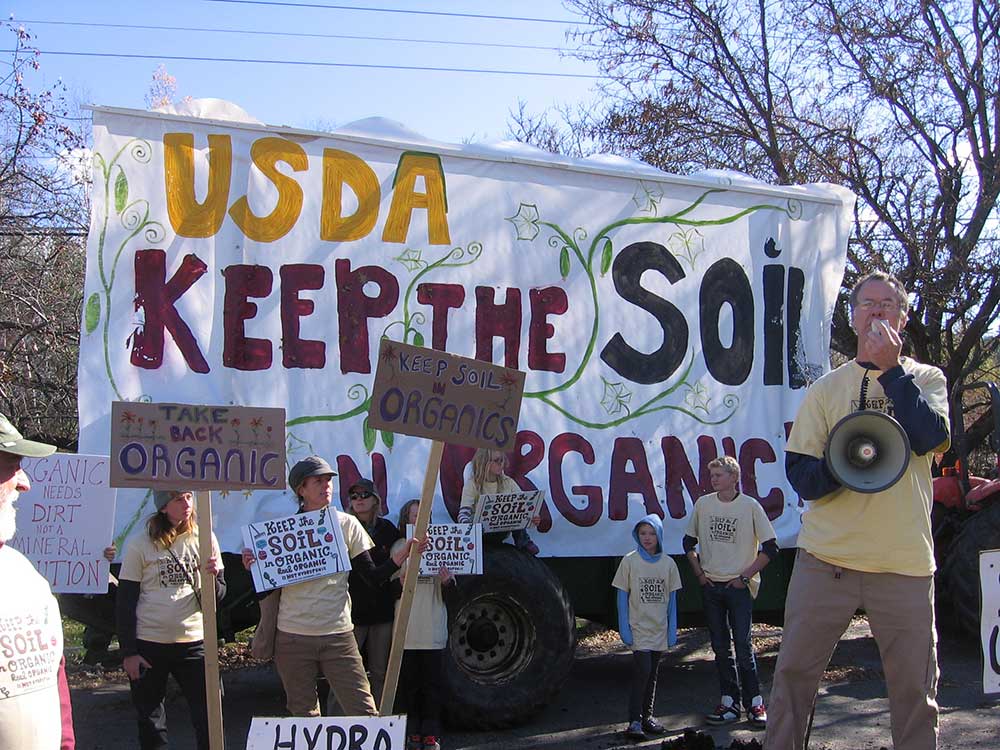
This analysis attempts to connect the dots profiling the relationship new appointees to the National Organic Standards Board have with corporate agribusiness (most of which are engaged, primarily, in conventional agriculture, food processing, and/or distribution).
The Organic Trade Association
Although it attempts to create an image as a group operating in the public’s interest, the Organic Trade Association (OTA) is an industry trade association representing the business sector. The OTA plays a big role in setting organic policy, often at odds with the Organic Foods Production Act (OFPA) and organic integrity as defined by founding members of the organic community:
- The Organic Trade Association represents corporations that buy from farmers, and some members have been accused of producing or importing massive quantities of fraudulent commodities and ingredients, seriously competitively damaging ethical, family-scale farmers. OTA has not taken action against some of its powerful members who have bypassed the NOSB approval process and used unapproved, non-organic ingredients in their products or others that have been found in “willful violations of law” on livestock factories they operate. This, then, makes the organization complicit with practices that undermine the integrity of the organic label.
- OTA proposed an industry checkoff (tax) on organic agricultural producers. This was rejected by most farmer and public interest groups, as the history of other agricultural commodity checkoffs have had few, if any, benefits, and they have accrued to agribusiness interests rather than to working farmers. Despite the vast preponderance of farmers and farmer-led organizations rejecting their proposal, after soliciting their opinions in nationwide “listening sessions,” they ignored the feedback from stakeholders and retained a powerful Washington law/lobby firm to pursue their multimillion-dollar marketing fund.
- Despite long-term cheerleading by OTA and USDA concerning the integrity of imported feed and ingredients, the regulatory agency recently announced that, after being forced to more closely scrutinize imports, 75% of organic operations in the Black Sea Region (primarily former Soviet bloc states, many with endemic levels of commercial fraud) have lost their certification. OTA immediately shifted from their cheerleading mode to forming a “task force” to study the situation—their standard scenario for first aid after the organic label receives a black eye.
- OTA brokered a “compromise” in Congress to legislation commonly known as The Dark Act, which stripped states like Vermont of the right to mandate informational labeling on GMO content. Instead, the legislation substituted federal rules that most in the organic community condemned as a giveaway to biotechnology interests.
A number of the most respected businesses in the organic industry have also recognized the concerns expressed by the nonprofit community. These include Nature’s Path, the largest manufacturer of certified organic breakfast cereal, and the iconic soap manufacturer, Dr. Bronner’s. Both companies very publicly withdrew their membership and financial support from OTA.
The incoming NOSB class of 2020:

Nathan Powell-Palm operates at 1,000-acre certified organic farm outside of Belgrade, Montana. Mr. Powell-Palm has a long resume of extensive involvement with the OTA and some of its affiliates.
Mr. Powell-Palm started growing his operation at a young age, and he serves on the board of the Montana Organic Association (MOA), one of just two organic farmer groups that we know of that endorsed an OTA proposal for an industry checkoff (tax) on agricultural producers. Unlike other farm groups, another MOA board member sits on OTA’s Board of Directors.
Mr. Powell-Palm has spoken at OTA conferences, participated in their Capitol Hill lobby days, and, in 2019, received the organization’s coveted “rising star” award. He is also trained as an organic inspector. He will sit in an NOSB seat reserved by Congress for a farmer.
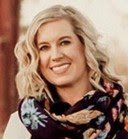
Kimberly Huseman works for Pilgrim’s Pride, an $11 billion business enterprise (2018) and the second-largest conventional poultry producer in the United States. Pilgrim has a growing interest in organic production as well. Ms. Huseman’s responsibilities include procurement of feed grain for their livestock. She will sit on the NOSB in a slot reserved for a handler.
Pilgrim, an OTA member, is part of an industry that has been under scrutiny for depending on a copious amount of imported feed rather than supporting and purchasing from domestic organic farmers.
Therefore, Ms. Huseman’s positions on this issue will be closely watched. The NOSB has also failed to resolve a number of scale-related poultry issues, in part due to the efforts of outgoing NOSB member Ashley Swaffar, who also worked for vertically integrated poultry companies.
Another poultry-related issue, a years-long controversy the NOSB has stalled on resolving, that will now be considered by Ms. Huseman, is the continued use of the synthetic amino acid methionine. Many public interest groups have accused major poultry producers and OTA of paying lip service to phasing-out the feed ingredient utilized, in part, to “supercharge” their production and facilitating confinement, factory farm conditions that are considered illegal in organics.

Gerald D’Amore works for a major conventional/organic industry produce handler, Munger Farms, which is a member of OTA. He has previously been employed by a number of other major, primarily conventional, agribusinesses. Many of these companies are also OTA members, including Dole, Chiquita, and Driscoll’s Strawberry Associates. Driscoll’s is certified by the nation’s largest USDA-accredited certifier, California Certified Organic Farmers (CCOF). CCOF certified early adopters of hydroponic technology, including Archi’s Acres in southern California. In light of the laws governing organics and previous NOSB decisions, most public interest groups believe soilless production is illegal. CCOF is among OTA’s largest financial supporters.
Mr. D’Amore is listed as a former vice president of Driscoll’s, the world’s largest berry marketer. With his experience in the company that helped pioneer certified organic hydroponic production, his voice on certified organic hydroponics will be watched carefully. Mr. D’Amore is currently listed in his LinkedIn profile as an independent consultant, although this was not disclosed by USDA, and will also be sitting in an NOSB handler seat.
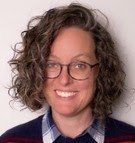
Mindee Jeffery has recently joined Eastside Food Co-op, in Minneapolis, as a grocery manager. Previously she was with a food retailer trade association and (prior to that, she spent 15 years at Good Earth’s Natural Foods, in California) an OTA member. She served as chair of the California Organic Products Advisory Committee (COPAC).
She nominated Karen Archipley as her replacement on COPAC. Archipley, a small-scale hydroponic-greenhouse grower from San Diego County, served as a spokesperson for an “Astroturf” group formed and financed by Driscoll’s, Wholesome Harvest, and other major hydroponic agribusinesses.
Unlike many of the other nominees, Ms. Jeffrey has a long-term, documented involvement in the organic movement and we hope that her independence and policy positions will be driven by the constituency at the respected member-owned cooperative grocer where she now works. She will sit in an NOSB seat reserved for retail.

Wood Turner currently serves as Senior Vice President of Sustainability at an investment firm, Agricultural Capital. Prior to that he worked for Stonyfield Farms, a major OTA member and contributor, while it was owned by Groupe Danone, the largest dairy concern in the world. According to press accounts and industry insiders, OTA, with Stonyfield’s leadership, brokered a provision in federal law, commonly known as The Dark Act, that established a weak labeling law concerning disclosure of genetically engineered ingredients, stripping states (like Vermont)—with preemption language—of the right to adopt more stringent state food labeling disclosure laws. Groups have pointed out that the “compromise” legislation has led to deceptive GMO [genetically modified organisms] labeling of food that sends consumers to company websites, which are misleading and fraudulent in extolling the benefits and safety of GMOs. The legislation also provides for the use of a warm and fuzzy logo.
With a background in urban and environmental planning, Mr. Turner will serve on the Board in an environmental protection and resource conservation seat.
Click here to view the announcement and bios released by the USDA for these new NOSB members.
The outgoing NOSB class of 2015:
Ashley Swaffar was appointed to the NOSB in 2015 as a “farmer.” At the time, she was employed by Arkansas Egg, a vertically integrated egg supplier that also did contract production for Vital Farms. Nothing in her application, which was secured through a FOIA request, indicated that she “owned or operated” an organic farm, as required by law. A suit was filed against USDA challenging her status on the board, along with that of Ms. Carmella Beck, a Driscoll’s employee who had also been appointed to a farmer seat. (Ms. Beck, a past OTA Member of the Year award recipient, left the board in 2015.)
The suit was filed on behalf of a working organic dairy farmer in Wisconsin and a beef producer in Ohio who had both applied for the farmer seats on the NOSB and had been passed over. A hearing on the merits of the lawsuit never took place. USDA attorneys (whose salaries are paid for by taxpayers) successfully argued that these farmers had no standing to bring the legal action. It is difficult to understand who would have standing in a legal challenge of this nature.
Subsequent to her separation from Vital Farms, an OTA member, Ms. Swaffar has operated a 7.5-acre organic farm in Arkansas, marketing at least partially through a trailer on her front lawn, and also has promoted herself as a consultant to the poultry industry.
Ms. Swaffar had a consistent record, nearing 70%, of voting in agreement with OTA lobbyist recommendations (on contested votes), including supporting hydroponic “organic” production.
Lisa De Lima, another 2015 NOSB appointee, has spent over two decades with the Maryland-based natural foods retailer MOM’s Organic Market, another OTA member.
Unlike some of the previous board members holding the retailer seat, she voted almost 70% of the time consistent with OTA policy on contested votes.
Tom Chapman was also appointed to the NOSB in 2015 to a handler seat. He is responsible for sourcing ingredients for California-based Clif Bar, an OTA member, with many key products sold as “made with organic ingredients,” rather than as certified organic. This is due to either not sourcing more expensive ingredients as certified organic and/or by using soy protein isolate or other materials that do not meet organic standards. Mr. Chapman also served as NOSB Chairman.
Like incoming board member Mindee Jeffery, Mr. Chapman also sits on the California Organic Products Advisory Committee and, additionally, is a member of the management committee of CCOF. During Mr. Chapman’s tenure on the board, CCOF successfully lobbied the NOSB to not intervene to prohibit hydroponic production, despite its inconsistency with the law.
In his leadership role as a former NOSB chair, Mr. Chapman strongly influenced the changing of NOSB process, the allowance of synthetic substances, and the permitting of practices, like hydroponics, that are viewed by organic advocates as undermining organic integrity and consumer trust in the organic label.
In this regard, it can be argued that, instead of building trust in the organic label, Mr. Chapman has done more damage than any other NOSB member—he has undermined organic integrity by personally shepherding through a wholesale rewrite of the Policy and Procedure Manual that dictates how the NOSB operates. This stripped power from the expert stakeholder panel and gave it to the political appointees and bureaucrats at USDA.
He aligned himself with former NOP director Miles McEvoy, who unilaterally eliminated the long-standing NOSB voting procedure for sunsetting synthetic/nonorganic materials—a default process of removing synthetics from the National List of Allowed and Prohibited Substances every five years, unless two-thirds of the board voted to relist the chemicals.
It should be noted that the initial, more cautious process, created by Congress, oversaw exponential growth of the organic sector and created economic stability for this important sector of agriculture worldwide based on consumer trust in the label and the governing process. As amended, two-thirds of the board are required to remove a synthetic from the National List. Materials never, in essence, sunset unless an extraordinary supermajority of the board takes action.
Mr. McEvoy has since left the USDA. The Cornucopia Institute filed ethics charges against Mr. McEvoy—although the USDA has never made the investigative documents available to the public. He now acts as an industry consultant. His clients include CCOF, the nation’s largest certifier (and the beneficiary of favorable rulings while he ran the NOP).
Harriet Behar was appointed in 2016 to fill the balance of an open term on the NOSB. She exemplifies the kind of expert organic industry stakeholder that was envisioned when the community collaborated with Congress in establishing the NOSB as an integral part of OFPA—a body designed to act as a buffer between organic rulemaking and corporate lobbyists.
Ms. Behar has a diverse background including over 30 years as a certified organic grower, commercial experience as the first marketer at CROPP/Organic Valley, an independent organic inspector, reviewer for a number of certifiers, longtime expert staffer with Midwest Organic and Sustainable Education Service (MOSES), and similar work more recently with the University of Wisconsin.
Her tenure on the board included a year as chair, where she was widely praised for her evenhanded approach and efforts to build public trust in the organic label. Her voice was decidedly aligned with the independent faction on the NOSB.
OrganicEye endeavors to leverage the extensive experience of our management and staff in farm policy, scientific research, and political and marketplace education/advocacy, acting as corporate and governmental watchdogs, educating the public and preventing the erosion of the foundational precepts of the organic movement.

